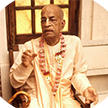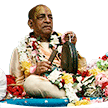Vedic Culture - an essential subject: Difference between revisions
(Created page with "Category:Essential Subjects <!----------------------- edit below this line -----------------------> <!------------------------ begin introduction text below --------------...") |
(Vanibot #0041: Moves Choose Another box to the end) |
||
| Line 2: | Line 2: | ||
<!----------------------- edit below this line -----------------------> | <!----------------------- edit below this line -----------------------> | ||
<!------------------------ begin introduction text below ------------------------> | <!------------------------ begin introduction text below ------------------------> | ||
The Vedic culture means to cleanse the heart and make him perfect. Brahma-bhūtaḥ, perfectly spiritualized. That is Vedic culture. Vedaiś ca sarvair aham eva vedyaḥ (BG 15.15). To know the Supreme Lord. That is Vedic culture. Now everything is topsy-turvied. Therefore, by the grace of Caitanya Mahāprabhu, He has simply recommended: harer nāma harer nāma harer nāma eva kevalam (CC Adi 17.21). Only chant. Then the result will be: ceto-darpana-mārjanam (CC Antya 20.12). The same result as the Vedic culture introduced will purify the heart to understand one's position. By the chanting of Hare Kṛṣṇa mantra, the same position will come. It is so nice. Kīrtanād eva kṛṣṇasya mukta-saṅgaḥ paraṁ vrajet (SB 12.3.51). Therefore there is no question of being depressed that: "We do not belong to this, do not belong to that." Never mind. Whatever it is. Simply chant and you'll become purified. That is Kṛṣṇa consciousness movement. | |||
Srila Prabhupada's books, lectures, conversations and letters offer a comprehensive presentation of this essential subject as seen in the Vaniquotes '''[[Vaniquotes:Category:Vedic Culture|Vedic Culture]]''' category. An introduction from his books is given below in the following | Srila Prabhupada's books, lectures, conversations and letters offer a comprehensive presentation of this essential subject as seen in the Vaniquotes '''[[Vaniquotes:Category:Vedic Culture|Vedic Culture]]''' category. An introduction from his books is given below in the following 10 quotes. | ||
<!-------- end introduction text and don't touch next three lines ---------> | <!-------- end introduction text and don't touch next three lines ---------> | ||
== Quotes from Srila Prabhupada's books == | == Quotes from Srila Prabhupada's books == | ||
<!----------------- edit quote boxes below this line -----------------> | <!----------------- edit quote boxes below this line -----------------> | ||
{{VaniQuotebox| | {{VaniQuotebox|According to Vedic culture one has to take leave of his family members just after his fiftieth year so that the balance of his life may be completely devoted in search of Krsna consciousness|Generally such situations occur in the material world. Therefore according to Vedic culture one has to take leave of his family members just after his fiftieth year so that the balance of his life may be completely devoted in search of Kṛṣṇa consciousness. '''(Śrīmad-Bhāgavatam 1.13.21)'''}} | ||
{{VaniQuotebox| | {{VaniQuotebox|According to Vedic culture, a woman must accept the husband given to her by her parents and remain chaste and faithful to him. Therefore King Saryati was surprised to see a young man by the side of Sukanya|It is not that because she dislikes her husband she may give him up and accept another. This is against Vedic culture. According to Vedic culture, a woman must accept the husband given to her by her parents and remain chaste and faithful to him. Therefore King Śaryāti was surprised to see a young man by the side of Sukanyā. '''(Śrīmad-Bhāgavatam 9.3.20)'''}} | ||
{{VaniQuotebox| | {{VaniQuotebox|According to Vedic culture, destroying the undeveloped embryo of the soul in the womb is as sinful as killing a cow or a brahmana|According to Vedic culture, destroying the undeveloped embryo of the soul in the womb is as sinful as killing a cow or a brāhmaṇa. In the embryo, the living entity is present in an undeveloped stage. '''(Śrīmad-Bhāgavatam 9.9.31)'''}} | ||
{{VaniQuotebox| | {{VaniQuotebox|According to Vedic culture, every respectable family has an acarya, or spiritual master|According to Vedic culture, every respectable family has an ācārya, or spiritual master. One is not considered a perfectly cultured man without being initiated and trained by an ācārya. It is said, therefore, that one who has approached an ācārya is actually in perfect knowledge. Lord Kṛṣṇa and Lord Balarāma are the Supreme Personality of Godhead, the master of all education and knowledge. '''(Kṛṣṇa Book, Chapter 45)'''}} | ||
{{VaniQuotebox| | {{VaniQuotebox|By following the Vedic culture, by performing great sacrifices and by becoming a strict follower of the Vedic instructions, one may become a brahmana, a sannyasi or an Aryan|The word Āryan means advanced. Unless one is spiritually advanced, he cannot be called an Āryan, and this is the difference between Āryan and non-Āryan. Non-Āryans are those who are not spiritually advanced. By following the Vedic culture, by performing great sacrifices and by becoming a strict follower of the Vedic instructions, one may become a brāhmaṇa, a sannyāsī or an Āryan. '''(Caitanya-caritāmṛta, Madhya-līlā 11.192 )'''}} | ||
{{VaniQuotebox| | {{VaniQuotebox|Because the age of Kali was seeking an opportunity to spoil the cultural heritage of the four orders of life, the inexperienced boy gave a chance for the age of Kali to enter into the field of Vedic culture|This boy was known as Śṛṅgi, and he achieved good training in brahmacarya by his father so that he could be as powerful as a brāhmaṇa, even at that age. But because the age of Kali was seeking an opportunity to spoil the cultural heritage of the four orders of life, the inexperienced boy gave a chance for the age of Kali to enter into the field of Vedic culture. '''(Śrīmad-Bhāgavatam 1.18.32)'''}} | ||
{{VaniQuotebox| | {{VaniQuotebox|Even if a young woman is given an old husband, she must respectfully serve him. This is chastity. It is not that because she dislikes her husband she may give him up and accept another. This is against Vedic culture|According to Vedic culture, even if a young woman is given an old husband, she must respectfully serve him. This is chastity. It is not that because she dislikes her husband she may give him up and accept another. This is against Vedic culture. '''(Śrīmad-Bhāgavatam 9.3.20)'''}} | ||
{{VaniQuotebox| | {{VaniQuotebox|For a woman of the brahmana, ksatriya or vaisya class to accept another husband in the presence of the husband she has married, or to file for divorce or accept a boyfriend or paramour, is unacceptable in the Vedic culture|For a woman of the brāhmaṇa, kṣatriya or vaiśya class to accept another husband in the presence of the husband she has married, or to file for divorce or accept a boyfriend or paramour, is unacceptable in the Vedic culture. Therefore King Śaryāti, who did not know the real facts of Cyavana Muni's transformation, was surprised to see the behavior of his daughter. '''(Śrīmad-Bhāgavatam 9.3.31)'''}} | ||
{{VaniQuotebox|In the Vedic culture there is a system known as sati or saha-marana, in which a woman dies with her husband. According to this system, if the husband dies, the wife will voluntarily die by falling in the blazing funeral pyre of her husband|In the Vedic culture there is a system known as satī or saha-maraṇa, in which a woman dies with her husband. According to this system, if the husband dies, the wife will voluntarily die by falling in the blazing funeral pyre of her husband. Here, in this verse, the feelings inherent in this culture are expressed by the wife of the brāhmaṇa. '''(Śrīmad-Bhāgavatam 9.9.32)'''}} | |||
{{VaniQuotebox|In the Vedic culture, an unmarried girl having association with a male is the greatest disgrace to the family|In the Vedic culture, an unmarried girl having association with a male is the greatest disgrace to the family, and so the caretakers cautiously informed their master that Ūṣā was showing symptoms indicating a disgraceful association. '''(Kṛṣṇa Book, Chapter 62)'''}} | |||
<!----------------- edit quote boxes above this line -----------------> | <!----------------- edit quote boxes above this line -----------------> | ||
| Line 30: | Line 34: | ||
'''Vedic Culture - [[Vaniquotes:Category:Vedic Culture|explore more within this category]]'''. | '''Vedic Culture - [[Vaniquotes:Category:Vedic Culture|explore more within this category]]'''. | ||
{{EsentialSubjectTotal}} | {{EsentialSubjectTotal}} | ||
<div style="float:left;"> | |||
{{EssentialSubjectnav}} | |||
</div> | |||
__NOTOC__ | __NOTOC__ | ||
__NOEDITSECTION__ | __NOEDITSECTION__ | ||
Latest revision as of 18:06, 22 November 2020
The Vedic culture means to cleanse the heart and make him perfect. Brahma-bhūtaḥ, perfectly spiritualized. That is Vedic culture. Vedaiś ca sarvair aham eva vedyaḥ (BG 15.15). To know the Supreme Lord. That is Vedic culture. Now everything is topsy-turvied. Therefore, by the grace of Caitanya Mahāprabhu, He has simply recommended: harer nāma harer nāma harer nāma eva kevalam (CC Adi 17.21). Only chant. Then the result will be: ceto-darpana-mārjanam (CC Antya 20.12). The same result as the Vedic culture introduced will purify the heart to understand one's position. By the chanting of Hare Kṛṣṇa mantra, the same position will come. It is so nice. Kīrtanād eva kṛṣṇasya mukta-saṅgaḥ paraṁ vrajet (SB 12.3.51). Therefore there is no question of being depressed that: "We do not belong to this, do not belong to that." Never mind. Whatever it is. Simply chant and you'll become purified. That is Kṛṣṇa consciousness movement.
Srila Prabhupada's books, lectures, conversations and letters offer a comprehensive presentation of this essential subject as seen in the Vaniquotes Vedic Culture category. An introduction from his books is given below in the following 10 quotes.
Quotes from Srila Prabhupada's books
Vedic Culture - explore more within this category.
Vanipedia has now over 903 introductory articles compiled from Srila Prabhupada's books under the series titled Essential Subjects. All these articles can be seen in the Table of Content on the right side of this article and also here in this Umbrella Category. Browse through them to relish the breadth and depth of Srila Prabhupada's teachings - There is a subject for everyone.









